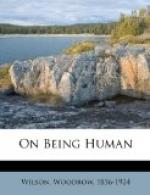We cannot easily see the large measure and abiding purpose of the novel age in which we stand young and confused. The view that shall clear our minds and quicken us to act as those who know their task and its distant consummation will come with better knowledge and completer self-possession. It shall not be a night-wind, but an air that shall blow out of the widening east and with the coming of the light, and shall bring us, with the morning, “murmurs and scents of the infinite sea.” Who can doubt that man has grown more and more human with each step of that slow process which has brought him knowledge, self-restraint, the arts of intercourse, and the revelations of real joy? Man has more and more lived with his fellow-men, and it is society that has humanized him—the development of society into a infinitely various school of discipline and ordered skill. He has been made more human by schooling, by growing more self-possessed—less violent, less tumultuous; holding himself in hand, and moving always with a certain poise of spirit; not forever clapping his hand to the hilt of his sword, but preferring, rather, to play with a subtler skill upon the springs of action. This is our conception of the truly human man: a man in whom there is a just balance of faculties, a catholic sympathy—no brawler, no fanatic, no pharisee; not too credulous in hope, not too desperate in purpose; warm, but not hasty; ardent, and full of definite power, but not running about to be pleased and deceived by every new thing.
It is a genial image, of men we love—an image of men warm and true of heart, direct and unhesitating in courage, generous, magnanimous, faithful, steadfast, capable of a deep devotion and self-forgetfulness. But the age changes, and with it must change our ideals of human quality. Not that we would give up what we have loved: we would add what a new life demands. In a new age men must acquire a new capacity, must be men upon a new scale, and with added qualities. We shall need a new Renaissance, ushered in by a new “humanistic” movement, in which we shall add our present minute, introspective study of ourselves, our jails, our slums, our nervecenters, our shifts to live, almost as morbid as medieval religion, a rediscovery of the round world, and of man’s place in it, now that its face has changed. We study the world, but not yet with intent to school our hearts and tastes, broaden our natures, and know our fellow-men as comrades rather than as phenomena; with purpose, rather, to build up bodies of critical doctrine and provide ourselves with theses. That, surely, is not the truly humanizing way in which to take the air of the world. Man is much more than a “rational being,” and lives more by sympathies and impressions than by conclusions. It darkens his eyes and dries up the wells of his humanity to be forever in search of doctrine. We need wholesome, experiencing natures, I dare affirm, much more than we need sound reasoning.




